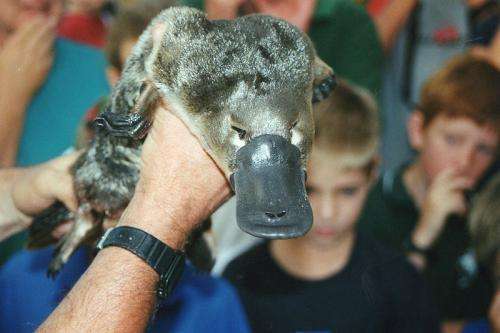December 4, 2013 report
Researchers find animals that evolve to have no stomach have same missing genes

(Phys.org) —A small team of international researchers has found that every type of jawed vertebrate they tested that has over time lost its stomach to evolution, such as chimaeras, numerous teleosts, lungfish and the platypus, also has the same missing genes. In their paper published in the journal Proceedings of the Royal Society B: Biological Sciences, the team describes their investigation into the genes of stomach-less vertebrates and it appears that they all lost the genes necessary for bringing them back should the need arise.
The stomach, as most are aware, is the place food winds up after being eaten. Inside of it, along with food and bacterial biota are pepsins which help break down proteins, along with acids that soften food to make it easier to digest. Both pepsins and acids exist because of characteristics within our genome. Without them, we'd die. But not all vertebrates have stomachs or some other similar organ to serve as a vessel for the dispersal of pepsins and digestive acids. This got the researchers to wondering if the genes responsible for causing the creation of them might have gone away as well. To find out, they studied 14 species of animals both with and without stomachs to see what differences they might have. More specifically, they checked to see if there were any differences in their genes.
As it turned, out, there were such differences. Every single one of the stomach-less creatures was missing the genes responsible for the production of pepsins and stomach acid. This, the researchers note, means that such animals could not re-evolve a stomach should the need arise—they'd have to start from scratch, a much lengthier process.
Other animals, the team notes, have also lost other parts to evolution, but have retained the genes responsible for their creation. Thus, if conditions change, all that's needed is for a marker to be turned back on for those parts to return. In the case of the animals that have lost the genes, the researchers theorize that it might have come about as a way to recover the energy lost in conserving such genes.
Next up for the researchers will be a new study to try to determine if there is a missing link in some animal—one that has devolved a stomach but still has the genes to go back if necessary.
More information: Recurrent gene loss correlates with the evolution of stomach phenotypes in gnathostome history, Published 4 December 2013 DOI: 10.1098/rspb.2013.2669
Abstract
The stomach, a hallmark of gnathostome evolution, represents a unique anatomical innovation characterized by the presence of acid- and pepsin-secreting glands. However, the occurrence of these glands in gnathostome species is not universal; in the nineteenth century the French zoologist Cuvier first noted that some teleosts lacked a stomach. Strikingly, Holocephali (chimaeras), dipnoids (lungfish) and monotremes (egg-laying mammals) also lack acid secretion and a gastric cellular phenotype. Here, we test the hypothesis that loss of the gastric phenotype is correlated with the loss of key gastric genes. We investigated species from all the main gnathostome lineages and show the specific contribution of gene loss to the widespread distribution of the agastric condition. We establish that the stomach loss correlates with the persistent and complete absence of the gastric function gene kit—H+/K+-ATPase (Atp4A and Atp4B) and pepsinogens (Pga, Pgc, Cym)—in the analysed species. We also find that in gastric species the pepsinogen gene complement varies significantly (e.g. two to four in teleosts and tens in some mammals) with multiple events of pseudogenization identified in various lineages. We propose that relaxation of purifying selection in pepsinogen genes and possibly proton pump genes in response to dietary changes led to the numerous independent events of stomach loss in gnathostome history. Significantly, the absence of the gastric genes predicts that reinvention of the stomach in agastric lineages would be highly improbable, in line with Dollo's principle.
Journal information: Proceedings of the Royal Society B
© 2013 Phys.org
















